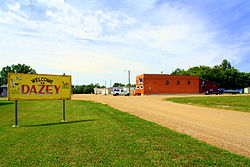Dazey, North Dakota
| Dazey, North Dakota | |
|---|---|
| City | |

Welcome sign in Dazey
|
|
 Location of Dazey, North Dakota |
|
| Location of Dazey, North Dakota | |
| Coordinates: 47°11′21″N 98°12′8″W / 47.18917°N 98.20222°WCoordinates: 47°11′21″N 98°12′8″W / 47.18917°N 98.20222°W | |
| Country | United States |
| State | North Dakota |
| County | Barnes |
| Founded | 1883 |
| Incorporated (village) | 1904 |
| Incorporated (city) | 1967 |
| Area | |
| • Total | 0.38 sq mi (0.98 km2) |
| • Land | 0.38 sq mi (0.98 km2) |
| • Water | 0 sq mi (0 km2) |
| Elevation | 1,434 ft (437 m) |
| Population (2010) | |
| • Total | 104 |
| • Estimate (2016) | 101 |
| • Density | 270/sq mi (110/km2) |
| Time zone | Central (CST) (UTC-6) |
| • Summer (DST) | CDT (UTC-5) |
| ZIP code | 58429 |
| Area code(s) | 701 |
| FIPS code | 38-18340 |
| GNIS feature ID | 1028623 |
Dazey is a city in Barnes County, North Dakota, United States. The population was 104 at the 2010 census. Dazey was founded in 1883 after a local farmer, Charles Dazey, donated land to start a townsite.
According to the United States Census Bureau, the city has a total area of 0.38 square miles (0.98 km2), all of it land.
Dazey was founded in 1883 and named for Charles Turner Dazey, who moved there from Illinois to run a bonanza farm in the early 1880s. Mr. Dazey donated the land to start the townsite. Mr. Dazey later moved back to Illinois where he became a successful playwright. It was incorporated as a village in 1904, and reached a peak population of 293 in 1920. It became a city in 1967, after the North Dakota Legislature enacted legislation that eliminated all existing incorporation titles for towns and villages in the state.
As of the census of 2010, there were 104 people, 46 households, and 25 families residing in the city. The population density was 273.7 inhabitants per square mile (105.7/km2). There were 56 housing units at an average density of 147.4 per square mile (56.9/km2). The racial makeup of the city was 98.1% White and 1.9% from two or more races. Hispanic or Latino of any race were 1.9% of the population.
There were 46 households of which 30.4% had children under the age of 18 living with them, 37.0% were married couples living together, 8.7% had a female householder with no husband present, 8.7% had a male householder with no wife present, and 45.7% were non-families. 37.0% of all households were made up of individuals and 6.5% had someone living alone who was 65 years of age or older. The average household size was 2.26 and the average family size was 3.04.
...
Wikipedia

